64
ARIANE KEPT MOVING for the next few years, following an unpredictable course through the world, taking her inspiration from the river Meander, trying to shake the fans who followed her, the most devoted members of her audience, people with nothing better to do than pursue her, their fanatical ardor sustaining their dogged persistence. For the first couple of years they published a newsletter, The Ariane Fan, so that the armchair audience back home could follow her, too, at least at second hand, through the reports of those who were tracking her in the field, and for a while one could call a hot line (1-800-SEEN HER) to find out where she was last spotted and what she had been up to lately.
Every few months, I received a letter from her, a letter written to herself; by that I mean that though her letters were addressed to me, they were full of advice to herself. The first of her letters was written in New York and mailed from London:
Dear Peter,
I’m writing this at the airport, waiting for my flight. There are about thirty people watching me write, and I’m taking a great deal of pleasure from the fact that they won’t get to see what I’m writing. I’m pretty certain that most of them will stay behind when I leave, watch the plane take off, then go home and never see me again, but quite a few of them intend to follow me to London, I’m afraid. In fact, right this minute a couple of guys are trying to buy tickets from people who are waiting for the flight—innocent bystanders who think they’re nuts, of course. We’ll see how many of them actually go through with it and follow me, but the reason that I’m writing to you, Peter, is that I want to give myself some advice, which may seem odd, but it seems even odder for me to write notes to myself, giving myself advice. Writing to you feels more normal, and I think I need to feel normal right now. Who knows—you may find something useful in the advice I give myself through you. I can’t say how valuable my advice will be, but my mother used to say that she would rather listen to gossip from her friends than wisdom from a stranger, and she also used to say, “Nothing beats home cooking,” so maybe if you don’t find what I have to say wise or fancy you will at least find it friendly and nourishing. So . . . although I wouldn’t presume to give you advice, let me say that I ought to try to keep in mind at all times the need to make of my life an interesting mix—something more like clam chowder than a mess of clams, because my mother used to tell me that it’s the contrasts and complements that make the chowder interesting. About the clams themselves, she used to say, “No chowder without ’em, no chowder with nothing but,” meaning that the point of the chowder is in the mix. You have to have clams, sure, but tomatoes, too, and even potatoes, because a chowder is about chunks, individual chunks of unlike things, and it’s the complements and contrasts that make the chowder work: tomatoes and potatoes, onions and celery, clams and carrots—just think of all the permutations and combinations, and that’s what makes each bite interesting. As it is with a chowder, so it is with a self and a life: the complements and contrasts make it interesting: laughter and tears, the profound and the ridiculous, the real and the not, the frivolous and the grave. I see from what I’ve written that my letters to you are likely to resemble clam chowder, too, but maybe they only seem disorganized, because there’s order in chowder, even if it isn’t apparent. (If you think there isn’t order in clam chowder, just imagine running a bowl through the blender, then you’ll realize just how much order there is.) The order in clam chowder is different from the order in a recipe for clam chowder, and you can impose order on clam chowder after the fact, by eating it in an orderly way. You could eat all the potatoes, and then eat all the little bits of carrot, and so on, but if you eat it that way, I would contend that you aren’t really eating chowder; you’re eating the chunks without the contrasts. Later, I think, I might make a book out of these letters, go back and find all the bits of clam and gather them together in one chapter, all the chunks of potato in another, the tomatoes in another. You get the idea. Impose a rational organization on it. If I ever do that, I think I’ll call the book Making Your Self, and so this version, these letters that I’m going to write to you, this chowder pot of advice to myself, could be called Making My Self.
Love, Ariane
(Years later, she did write that book, and now it is in its sixth edition. It has been greatly revised and enlarged, and it now has a subtitle. It is called Making Your Self . . . and Dinner.)
[to be continued]
Have you missed an episode or two or several?
You can begin reading at the beginning or you can catch up by visiting the archive or consulting the index to the Topical Guide. The Substack serialization of Little Follies begins here; Herb ’n’ Lorna begins here; Reservations Recommended begins here; Where Do You Stop? begins here; What a Piece of Work I Am begins here.
You can listen to the episodes on the Personal History podcast. Begin at the beginning or scroll through the episodes to find what you’ve missed. The Substack podcast reading of Little Follies begins here; Herb ’n’ Lorna begins here; Reservations Recommended begins here; Where Do You Stop? begins here; What a Piece of Work I Am begins here.
You can listen to “My Mother Takes a Tumble” and “Do Clams Bite?” complete and uninterrupted as audiobooks through YouTube.
You can ensure that you never miss a future issue by getting a free subscription. (You can help support the work by choosing a paid subscription instead.)
At Apple Books you can download free eBooks of Little Follies, Herb ’n’ Lorna, Reservations Recommended, and Where Do You Stop?
You’ll find overviews of the entire work in An Introduction to The Personal History, Adventures, Experiences & Observations of Peter Leroy (a pdf document), The Origin Story (here on substack), Between the Lines (a video, here on Substack), and at Encyclopedia.com.

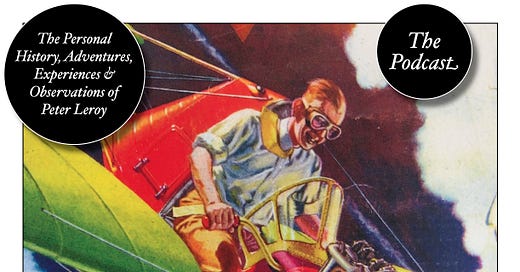




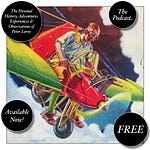
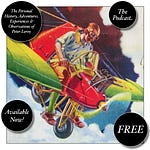

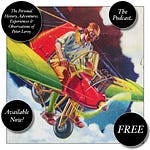



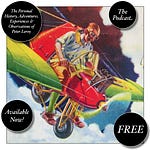
Share this post